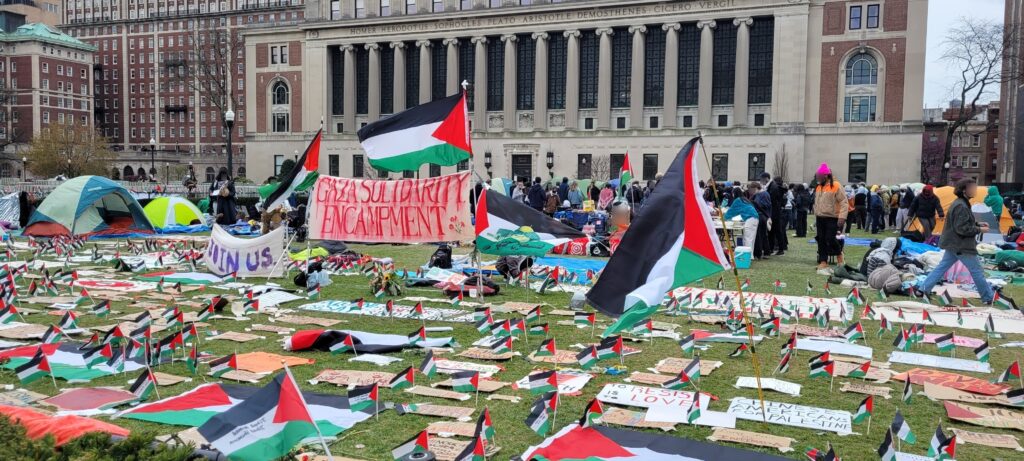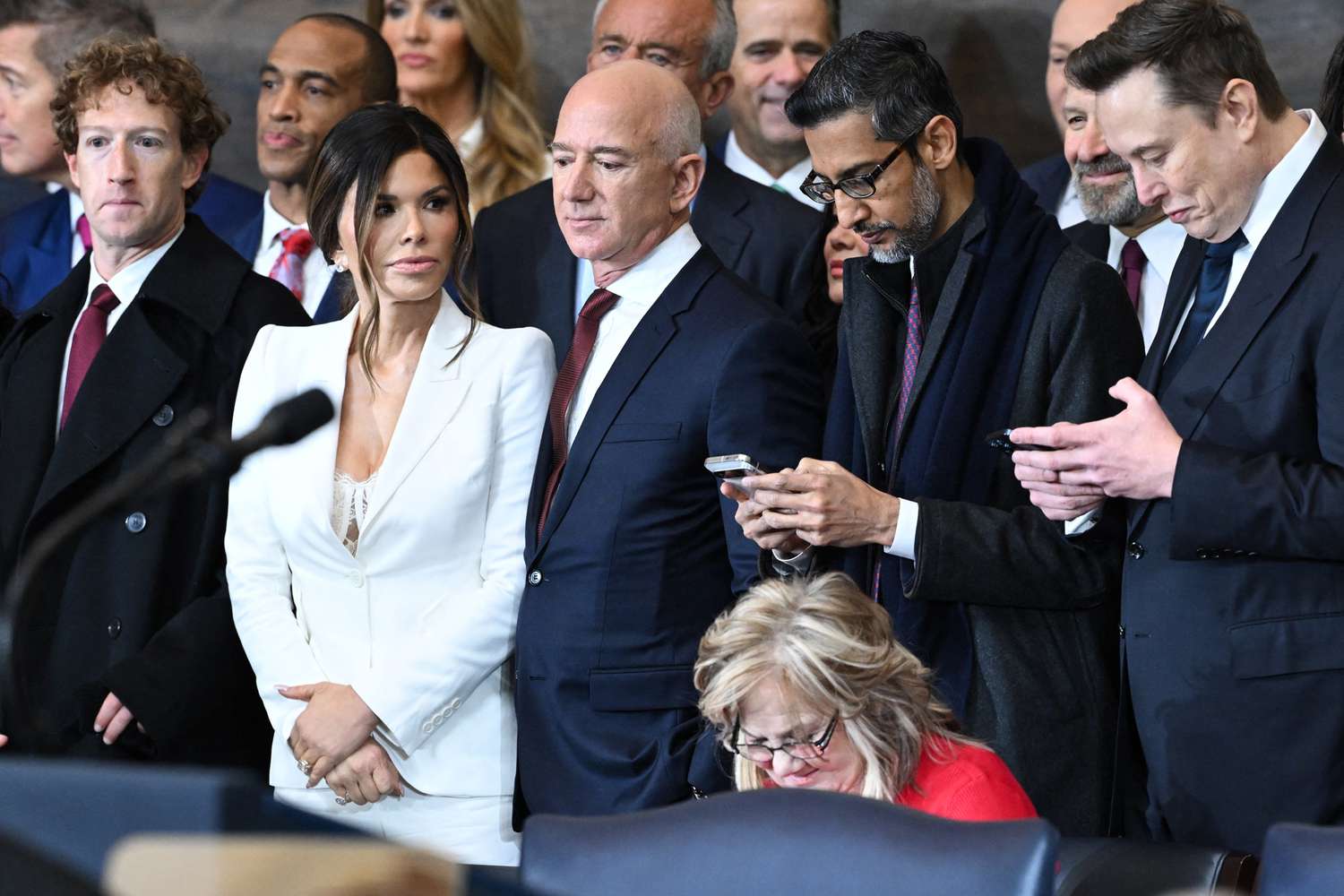In 2024 Donald Trump was elected to his second term as president of the United States of America. Mass deportations and incarcerations have characterised this term, alongside continued and intensified support for Israel’s genocide of Palestinians; tariffs and trade wars waged against the rest of the world; attacks on transgender rights and the rights of many other minority groups; increased environmental exploitation and other injustices.These assaults have sparked resistance. From Bernie Sanders’ “Fight Oligarchy” rallies to mass street demonstrations, campus occupations, and disruptive sit-ins, it is clear that there is an appetite for a fight back.
Over the last year and a half, there has been a significant uptick in campus protests across the US, overwhelmingly against the government and public institutions’ support for the genocide in Palestine. The protests began before the second election of Trump, and have taken the form of marches, sit-ins, encampments, and building occupations. These protests have been met with considerable repression from the universities’ administrations, the police, and the state. The Columbia University (New York) protests are a stark example. The first protest encampment at Columbia began on 17 April 2024, and focused its internal efforts on education, through film screenings and teach-ins. Shortly after the establishment of the camp, police started amassing near campus, and the next day the police (at the behest of the university president) stormed the camp and arrested dozens of protesters while university staff cleared away the tents and confiscated belongings. In a show of resilience and steadfastness, protesters moved to a different lawn and set up camp there – this time, bigger, stronger, and lasting much longer. Following negotiations, a hard deadline was set by university management for the protesters to dismantle the encampment and leave or be suspended. The protesters voted to stay, and as the deadline neared, supportive staff members formed a protective ring around the encampment. Throughout this process university management failed to budge on the demands of the protesters. In a bid to press their demands, the protesters moved from their encampment into a university building called Hamilton Hall, which they subsequently renamed Hind’s Hall after five-year-old Palestinian child Hind Rajab who, along with her family, was murdered by the IDF. Large numbers of riot police assembled outside of campus and broke into Hind’s Hall, used stun grenades on protesters, arrested many students, and forcefully cleared the building. These events inspired a wave of similar protests across the US and beyond.
This was by no means the end of the pro-Palestine campaign on campus – protests of varying intensity have continued to the time of writing. It is, however, a clear example of the level of repression faced by protesters even before Trump’s election. Since Trump was elected he has stated on numerous occasions that the crackdowns on student protests had been and continues to be inadequate, and he is now leading an even more extreme crackdown on protesters. Through March and April the Trump administration has withheld some 650 million dollars of funding to Columbia University for their supposed “soft handling” of protests on campus. He has threatened to do the same to other universities which allow “illegal protests”.
Columbia University’s Mahmoud Khalil is among the leaders of the student protests and, importantly, is also a permanent resident of the United States. On 8 March 2025, Immigration and Customs Enforcement (ICE) agents took him from his apartment. They did not have a warrant, nor were they acting independently. The Department of State, headed by Marko Rubio (a member of Trump’s executive), directed ICE to detain and deport Mahmoud Khalil for his role in the student protests. In subsequent court proceedings, it was ruled that Khalil’s deportation can proceed, and he can be stripped of his permanent residency. Though Khalil is being made an example of, he is certainly not the only person facing this repression. Mohsen Madawi, also of Columbia University, was detained for his role in student protests, and Rümeysa Öztürk was kidnapped by plainclothes, masked agents of the Department of Homeland Security over a Tuft University op-ed she co-wrote. Many other students are having their student visas revoked for as little as making a social media post about the government or an institution’s support for the genocide of Palestinians. The scale of oppression faced by student protesters is more heavy-handed than anything we’ve seen since Black Lives Matter, and Trump’s administration is flagrantly ignoring due process in order to assault political dissenters. The use of deportations as protest repression is an especially egregious attack on free speech and freedom of movement.
Both the Democrats and the Republicans have been whipping up racist, anti-immigrant sentiment for years, competing to prove to the US population that they are the most anti-immigrant political party. Why? Aside from being logical manifestations of the legacy of US racism, the ruling class scapegoats immigrants to deflect from their own failings and the systemic failings of capitalism, and to prevent unity among the working class. As can be seen in the case of Khalil, immigration policing is also being used as a vehicle for greater state crackdown on political dissent – as, thanks to years of anti-immigrant legislation, migrant groups have weaker legal protections. Attacks on migrants can serve as the thin end of the wedge, normalising increased surveillance and repression of political dissidents. We are now seeing the results of this political targeting of immigrants, and it is bleak. Immigrants are being persecuted regardless of “legal” status; ICE are raiding homes and workplaces, arresting immigrants and US-born citizens alike. In just the first 50 days of Trump’s presidency, tens of thousands of people were arrested. ICE agents are often acting without court orders and are conducting, according to lawyers involved in active cases, illegal searches. Over forty thousand people are currently being held in ICE detention facilities, many of whom are awaiting a court hearing in a situation where the immigration courts have an obscene backlog of cases. ICE is detaining people and threatening them with deportation over incursions as minor as traffic violations or simply being undocumented, and is deporting people who have lived in the US their whole lives.
All of this has triggered much protest action. From January to the time of writing, there have been mass street protests across several states, raising slogans of “No one is illegal” and “Abolish ICE”. There have been a number of instances where snap protests have been called to physically obstruct ICE deportation raids. In Worcester, Massachusetts, on 8 May 2025, several people were arrested when a crowd intervened during an ICE arrest. ICE agents refused to show a warrant, and local police reportedly assaulted a 16-year-old girl during the incident, slamming her to the ground and pressing her face to the dirt.
In the liberal imagination, the march of history moves generally in the direction of “forward progress” as people become better informed and vote their way to a fairer society. To this ideology, Trump represents an assault on the system, an upset that is taking us “backwards”. This is a misunderstanding. During Biden’s presidency, socialists warned that a failure to end the massacre in Palestine, alongside the myriad failures of neoliberalism, would give rise to another far right victory in the form of Trump’s return. As the US struggles to compete with an ascendant China, the nation only becomes more volatile, desperately trying to right a ship that has been sending the product of its labour overseas to explode in the Middle East and Eastern Europe. These increasingly vicious assaults on free speech and other basic rights are symptomatic of this heightening imperial tension. The US working class, like our own in this country, has been atomised and disoriented but continues to learn lessons through mass action and collective struggles – and it shares those lessons with us. Today, attacks on our ability to organise in Aotearoa are more muted, taking the form of random police assaults and pepper spraying of protestors, rather than targeted political repression. That said, any attacks on our side must be opposed and, if necessary, organised around and fought back against politically. Our ability to organise and speak radical truths loudly has been fought for and won, and in the long run, we cannot rely on capitalist law and courts to protect us – this tradition will always fall to us to protect.








